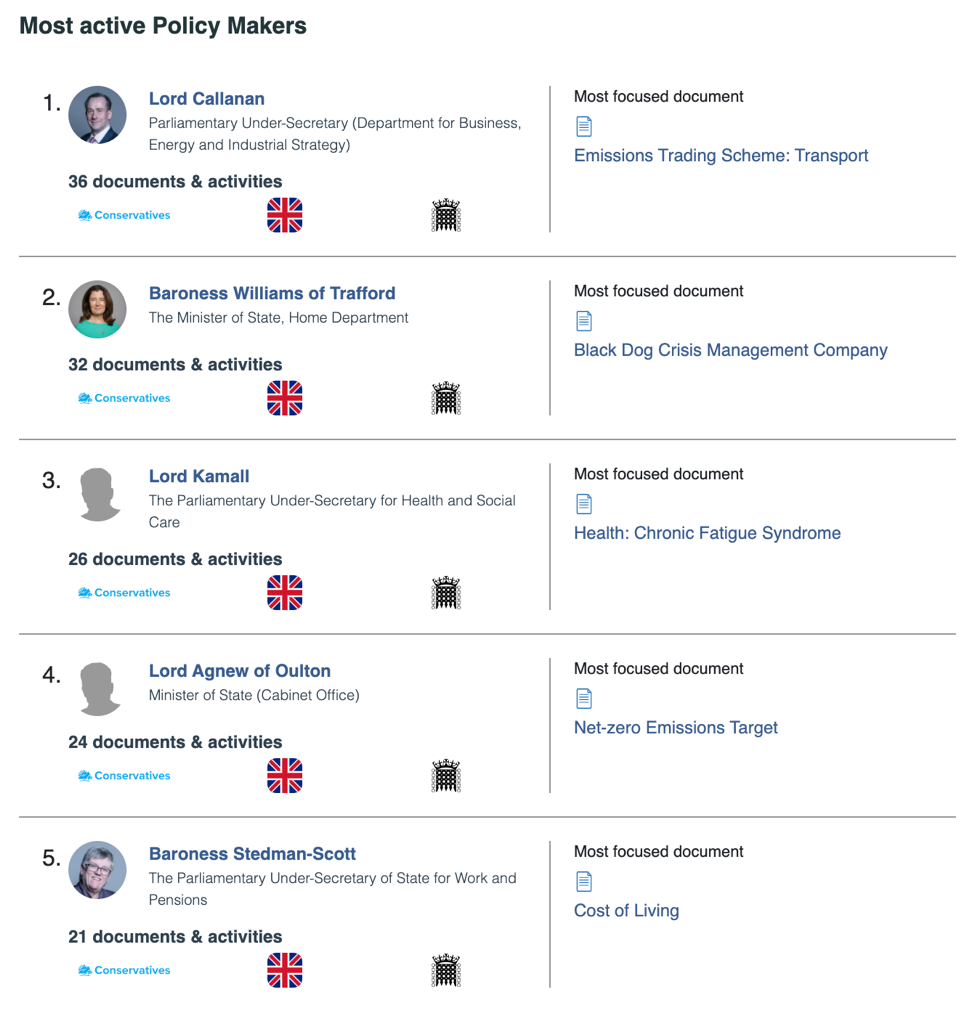What are some of the most relevant policy trends in the UK House of Lords?
The Policy-Insider.AI platform registered 874 policy documents published by the House of Lords in the week of 11-17th October. We identified the most activity on Tuesday with over 350 documents and activities. Notably, the House of Lords did not publish documents on Friday 15th October due to a non-sitting Friday. In the past week, the House of Lords had to deal with many multifaceted issues, making categorising policy documents into a single policy area particularly difficult. Nevertheless, the most frequently discussed topics concerned environmental, financial and social policies, such as health and education. Below, we zoom into specific subjects and policy trends regarding welfare provisions and the environment.


Social policy trends
This week the Members of the House of Lords took part in many debates about the future of social care in England. The debates highlighted the problems prompted by the Covid19 pandemic and the resulting government social care plans. The Parliamentarians engaged in an eager Second Reading debate on the Health and Social Care Levy Bill. The passed bill has important implications for the British healthcare system. It aims to reduce the NHS backlog and provide sustainable adult social care. This reform requires a £36 billion investment funded by introducing a new 1.25% health and social care levy.
Lord Young of Cookham inquired about the access to Child Trust Funds by adults with learning difficulties. Moreover, the Members of the House of Lords discussed protecting the value of state pensions in the upcoming year, regardless of decreasing taxpayer earnings. Other welfare-related topics discussed included the cost of living crisis, examination of the schooling system, new guidelines for managing the Chronic Fatigue Syndrome and increasing risk of Type 2 Diabetes.
Environmental policy trends
The Environment Bill was the main policy document discussed on multiple occasions in the House of Lords. Parliamentarians aimed to finalize the bill by voting on a series of amendments. Such amendments concerned topics ranging from charges for single-use plastic items to water abstraction and forestry commodities. Parliamentarians were also engaged in a discussion about sustainable food production and agriculture.
Other discussed topics included the use of hydrogen-fueled vehicles as an alternative to battery-powered electric vehicles. Moreover, Members of the House of Lords discussed the Reducing emissions: 2021 Progress Report published by the Climate Change Committee on 26th June. The Parliamentary discussion focused on developing public engagement to achieve the 2050 net-zero carbon emissions target. To that end, the Parliamentarians proposed monitoring and evaluating the government’s ability to encourage social change with regard to sustainability.
Who are the most active policymakers in the House of Lords?
Now we take a closer look at individual policy makers and related policy activity, including social and environmental policy trends. The House of Lord Members have been very active, with the most engaged policymaker Lord Callanan reaching 36 documents and activities. Lord Callanan, the Parliamentary Under-Secretary from the Department for Business, Energy and Industrial Strategy, has been the most engaged in environmental policy, especially the Emissions Trading Scheme. Clearly, policymakers focused on solving the environmental crisis as yet another politician concerned with environmental policy scored high on our list. Lord Agnew of Oulton, who engaged in 24 policy-related activities, concerned himself with the policy on reaching the Net Zero Emissions Target.
In the meantime, Baroness Williams of Trafford (32 documents and activities) was concerned about the government spending on the services of the Black Dog Crisis Management Company. Furthermore, two politicians on our list focused on social policy. Lord Kamall (26 documents and activities) engaged with the policy on the Chronic Fatigue Syndrome. Meanwhile, Baroness Stedman-Scott expressed interest in the increase in living costs in the United Kingdom.

Find out more about the most recent trends in UK politics by using our Twitter trends tracker or read last week’s UK Digest.
This article was originally published in English. Translations have been generated automatically and may be incorrect.


